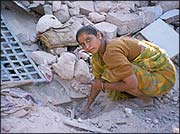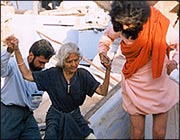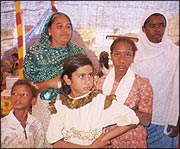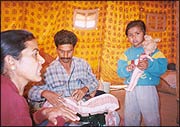| February 26, 2001 |

|
HOME | NEWS | SPECIALS | |||||||||
|

|
The Rediff Special/Archana Masih The Courage of Bhuj
A month ago this day, a horrifying earthquake destroyed the lives of hundreds of thousands of people in Gujarat. An estimated 100,000 people were killed, many times that number were maimed for the rest of their lives. Even those who escaped unscathed lost friends and kin, and their homes to nature's fury.
Rehabilitating the wounded and homeless millions is perhaps the most daunting task any Indian government has undertaken since Independence.
In this, the first of a monthly series on the state of rehabilitation and relief in Gujarat, Features Editor (News) Archana Masih and Photographer Dominic Xavier visited Bhuj to find out how the victims of the worst earthquake in recent Indian history are coping with the catastrophe's aftermath.
Today fate has been kind, but not quite. After digging with their bare hands for several hours, the brother and sister finally hit upon its stainless steel handle, gleaming under the harsh afternoon sun. It is just then that luck decides to abandon them, perhaps in search of another desperate earthquake victim. "If I could take the machine out, I could begin my dhanda," says Dinesh, a tailor. Having failed to budge the machine any further, the siblings cover it with rubble and tell each other that they will return the following day. The old city of Bhuj has many such returning natives. Bulldozers still work at removing rubble and have managed to clear the main pathways. The local administration has placed the area out of bounds at night. Uniformed policemen watch over the gigantic mass of debris that was once home to nearly half the city's population and a busy centre of business. "That old woman refuses to leave her home," laughs a policeman, pointing at a precariously balanced two storeyed house. Locals say 70-year-old Babbiben has a degree in law and knows several languages. But with no family, she has chosen to live and die in her home.
In temples, open grounds, by the roadside, for the homeless in and around Bhuj, life has been harsh since the January 26 earthquake. Over a month later, tents still remains a problem. A lucky handful have a tent for their families, the others share theirs, sometimes with 50, 60 others. Distributed by the government, army and non governmental organisations, tents have been sent from various countries -- Saudi Arabia, Iran, Turkey and Finland. The Gujarat government has also distributed tarpaulin and plastic sheets, but the shortage of tents remains a common complaint. District Collector Anil Mukim maintains that though shelter remains a problem, it will be sorted out shortly. "This tent has been hired from a private company, yesterday they came and took away half of it," says Rukya Qureshi, a worker at the state health department. Occupied by several Muslim families, the few lights hung on bamboo poles had already been removed. Unaware of how long they would live here, the women say life would be much more bearable if the government supplied them with enough kerosene. "At least we can cook for ourselves without having to depend on what we get as relief, which is so erratic. It is a question of this stomach. For us survivors, living is like death. Those who died are better off," adds Zarina Bi. The women explain since the water supply depends on tankers, they can only bathe once in 4, 5 days. Clothes are washed by the lake which is some trek away and the ground beyond serves as a public toilet. "We womenfolk wait till it becomes dark... it is not proper for us to go in broad daylight," continues Zarina. Her friend Rukya takes over from her and explains that people from other castes and faiths also share their tents. "Look, those are Hindus and also live here, but they -- what can I say about them? -- they are very poor," she says. The dark woman with negroid features has a different story.
A community of bandhini (tie and dye) workers, the Sidhis say all they have received so far is some rations through the public distribution system. The government has provided 20 kgs of wheat, 5 kgs rice and 5 litres of kerosene through ration cards. Those who have lost their ration cards can get a temporary one from their respective civic wards. People say it does take time, but obtaining another card is a lesser ordeal than queuing up for rations. Many agree that though plenty of relief has poured in, it has not reached the people because of poor coordination. That private groups often entrusted a few within a community to distribute the material, which in turn is siphoned away by them. "There are some who are good in the beginning, but greed gets the better of them when they see the freebies," explains Bharti Udbhati who lived by the roadside with her two small children for 10 days before being assigned a tent in Jubilee ground, Bhuj's central area. She, her husband and kids now share their small tent with another man who has left for Bhachau to avail of the cash dole promised by the government. The Udbhatis feel uncomfortable sharing their space with an outsider. To make matters worse, their cohabitant does not keep his part of the tent clean. "Since he is not here, I have cleaned his part of the tent as well," says Bharti's husband Girish, a mechanic with the state transport department in neighbouring Rapar. He says their tent was provided by the Rashtriya Swayamsevak Sangh and blankets by some other group. They were provided some dry snacks and biscuits, but since they have no stove or oil it is impossible for them to heat milk for their children. The tea stall that existed till yesterday has also moved out. Their eight-month old son has been unwell and the only toy that Purbi, their six-year-old daughter, now has is a one armed doll. The family earlier used to walk to the Swaminarayan temple for lunch and dinner, but now prefer the langar (community meal) run by Sikhs in Rawalwadi.
Both the langar run by Sant Baba Mann Singh and the Swaminarayan santha are said to feed over a lakh people every day. The langar -- a similar one ran for three months after the 1999 Orissa cyclone -- has 700 volunteers from Punjab and uses 70 stoves to cook meals. Baba Mann Singh says he expects the langar to continue and has 60 to 70 private security staff from Punjab to help coordinate the operation. Giving an insight into the Swaminarayanan operations, spokesperson Janak Dave says the organisation fed as many people who came to its doors from January 26 onwards. "Our temples usually stock supplies for a whole year, so for the first 15 days we managed with that," he says. With close to 435 volunteers -- many of whom furiously coordinated on walkie-talkies -- the organisation has made arrangements for the stay of between 150 to 160 families in the open ground opposite its newer temple. The old temple, which was 180 years old and lay within the walled city, is destroyed. Swamis supervising the removal of the old temple's wooden edifice revealed that five people died in the temple when the quake struck. The organisation has constructed makeshift toilets and bathing compartments, and construction of one roomed tin houses has begun. "They have told us that each family will get one 12 ft by 12 ft tin house," says Shantilal Thakkar, a cloth dealer living in the Swaminarayanan camp. The tent is home to 37 people. Housewife Vandana Ishwarlal Pomal explained they spent most of their time chopping vegetables and singing bhajans. "We come back to the tent for two hours after lunch. The only time we went out into the city was on Mahashivratri, the other times we have left this place is when we go to the lake to wash clothes." Tears run down Vandana's cheeks. Her teenage daughter says the family lost her elder sister and her two-month-old child to the quake. "We could not find their bodies for two days. She was 19 and had not even completed one year of marriage," said Meenakshi, who has dreams of pursuing a career in computer programming. This was one calamity that did not discriminate. It affected the middle class, many others like Vandana Pomal. Like Dr Praful K Rana, who after sending his family to Baroda, has been frantically making calls to insure his marble floored home which was not severely damaged. Or Naishadh Jobanputra, who lost his medicine shop although his home was strong enough to withstand the tremors. A section that has come to expect certain luxuries as a way of life now spends its nights in tents propped outside their damaged homes. "Since the devastation outside the walled city was not too great," says Jobanputra, "We cook, eat, watch television inside the house during the day, but sleep outside in the night." His ten-year-old son Kunal, of course, hasn't been happier. Life in a tent has been the best adventure he has had so far. With school not scheduled to reopen till March 1, he says he has had a super time 'studying' his atlas and playing in his tent. Like Kunal Jobanputra, devastated Bhuj does not fail to surprise outsiders. Its spirit takes your breath away. "For the past few weeks, my favourite pastime is standing in queues," Meena Rathore had earlier laughed outside her tent in Mamanwadi, where Muslims outnumbered Hindus. "Today also I went with these cans for kerosene, and guess what I have got -- tun tun Gopal (nothing)." Rathore, along with 2,000 others, lives in a camp "where a community kitchen serves both Hindus and Muslims," says Adaba, the local municipal councillor. As a small group gathered around her outside her tent, spilling out their woes against governmental apathy and the already dwindling trips of NGOs -- they hold on to their humour. Drawing parallels with filmstar Govinda's television game show Chappad Phaad Ke -- they joke that the programme has come true in their lives. In the face of huge personal loss, amid collapsed homes, the people of Bhuj tower high. Offering strangers food, water, tea, a chair, from what little they have left they courageously smile and say if given the right kind of assistance, they will rebuild Kutch in a year. It is a contention that seems almost unbelievable, but then maybe not. Design, Photographs: Dominic Xavier
Part II: Rebuilding from the Rubble
The Earthquake: The Complete Coverage Tell us what you think of this special report |
HOME | NEWS | CRICKET | MONEY | SPORTS | MOVIES | CHAT | BROADBAND | TRAVEL
ASTROLOGY | NEWSLINKS | BOOK SHOP | MUSIC SHOP | GIFT SHOP | HOTEL BOOKINGS
AIR/RAIL | WEDDING | ROMANCE | WEATHER | WOMEN | E-CARDS | SEARCH
HOMEPAGES | FREE MESSENGER | FREE EMAIL | CONTESTS | FEEDBACK

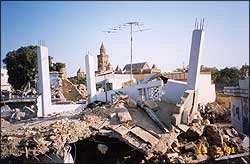 Part II:
Part II: 